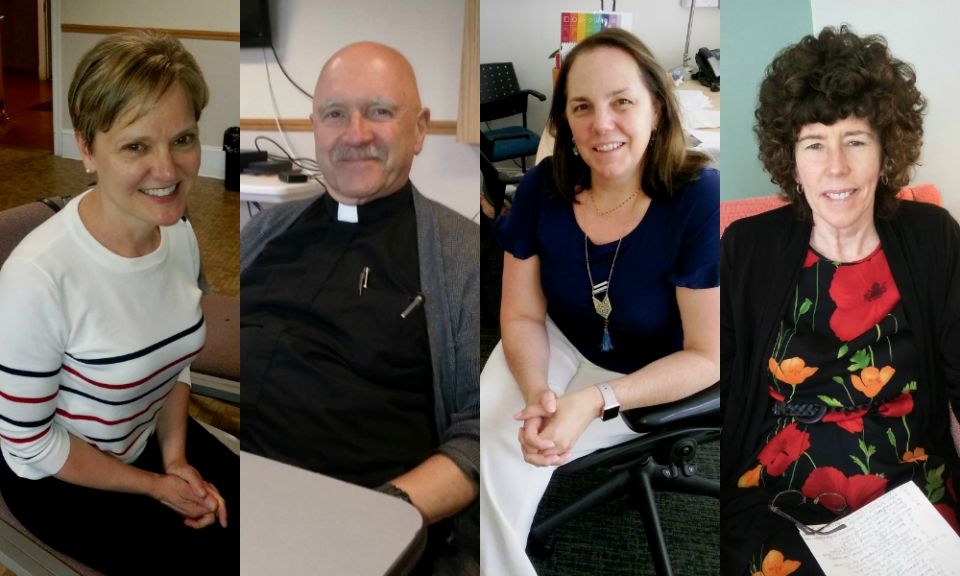Parishioners at Two Philadelphia-area Churches Organize on Abuse Crisis
By Peter Feuerherd
They are two parishes with different profiles. St. Malachy, on this city's north side near Temple University, attracts a wide ethnic mix, in a neighborhood with some rough edges, appealing in part to those as far away as New Jersey seeking an urban parish with a long tradition of social justice outreach. By contrast, St. Thomas of Villanova, in a leafy suburb, attracts many professionals, including professors from nearby Villanova University. Like the university, the parish is run by Augustinians. Different parishes, but similar reactions. Unbeknownst to each other, parishioners at both churches wanted to do something, anything, when hit by the cascade of sex abuse stories that rocked the Catholic Church last summer, including a Pennsylvania grand jury report and the scandals involving former Cardinal Theodore McCarrick. As Catholics in an archdiocese that experienced its own massive turmoil back in 2005, when scores of priests were implicated by a grand jury, they needed to talk. At St. Thomas of Villanova, Augustinian Fr. Joseph Genito, the pastor, asked parishioners to email him with their thoughts. They didn't hold back. "Focus on the corruption in the church," said one writer. "This crisis has shaken our family to the core," wrote another. Still another, "The kind of pain inflicted by the perpetrators takes years to digest and longer to get over." Besides anger, there were detailed suggestions to reform the Catholic Church, ideas like withholding money from the archdiocese till changes occurred, and opening up more roles for women. In response, Genito called parishioners together and they formed WATCH — We Are the Church. "As the laity, we have no ownership," parishioner Mia Holman said, summing up the concerns of parishioners. WATCH soon began organizing. It has formed committees on lay leadership; legislative action (to support opening up the statutes of limitations on sex abuse in Pennsylvania, a stance long opposed by the state's Catholic bishops); and parish finances, to in part investigate how funds were raised by the archdiocese to make sex abuse payments and settlements. Other task forces include victims' healing; networking with other Catholic groups (the parish has made contact with parishes in Piedmont, California, in Atlanta and in Chicago doing similar work); parish education and coordinating the use of art and discussion to encourage response to the sex abuse crisis. The first order of business for the group was to write a letter in the name of the parish to Pope Francis, with copies sent to Galveston-Houston Cardinal Daniel DiNardo, president of the U.S. Conference of Catholic Bishops, and Philadelphia Archbishop Charles Chaput. "The leadership of the Catholic Church in the United States has failed to understand the enormity of the disillusionment and pain suffered by the people in their parishes and institutions," the letter stated. It called for the resignation of those bishops who participated in cover-ups, as well as reforms in financial accountability and expanding the role of women in the church. "We don't want to be stonewalled or lied to," Nancy Costello, a parishioner and WATCH participant, told NCR. Meanwhile, at St. Malachy, a similar group of outraged and involved parishioners set about with another set of responses. "We have to do something about this," Bill Hartman, a parishioner, said was his first reaction to the news of last summer. Organized by the Catholic Peace Fellowship of Philadelphia, which meets at the church, St. Malachy became another venue for area Catholics disturbed by the crisis. Fr. James Paradis, prior of the Augustinian community based out of St. Augustine Church, wrote a series of reflections on sex abuse that were incorporated into a Stations of the Cross prayer pamphlet. "There is a grief, loss and a sense of betrayal that people are feeling," said Cara Tripodi, a therapist who has assisted the St. Malachy/Catholic Peace Fellowship group. Ann Carr, a pediatrician, said she sees Catholics as experiencing "betrayal trauma," much like what she sees with children experiencing abuse at the hands of parents. The meetings with parishioners at St. Malachy included priests who expressed their anguish at the crisis and how it has affected the reputation of all Catholic clergy. That feeling extends to the wider church as well, said Tripodi. "People are ashamed to say they are Catholic. It is guilt by association," she said. That sense of shame, and anger, pervades across the Catholic spectrum, according to the emails sent to Genito. Causes of the abuse crisis, the writers said, include the church being picked on because of its support for traditional sexual morality, while other groups remain largely unexamined. Others argue that the church needs to trust laypeople — and women — to run parishes, since there are fewer priests. But whatever their perspective, they agreed that action is needed and that parishioners need a venue to talk about what they think should be done, much like what has been put in place at St. Malachy and St. Thomas. "Are we tired of hearing about it [the sex abuse crisis] on the news? Yes. But we are not tired of hearing about it within our own parishes. In fact the near silence over the past 15 years has been deafening," noted one correspondent. Peter Feuerherd is NCR news editor. His email address is pfeuerherd@ncronline.org
|
.
Any original material on these pages is copyright © BishopAccountability.org 2004. Reproduce freely with attribution.
